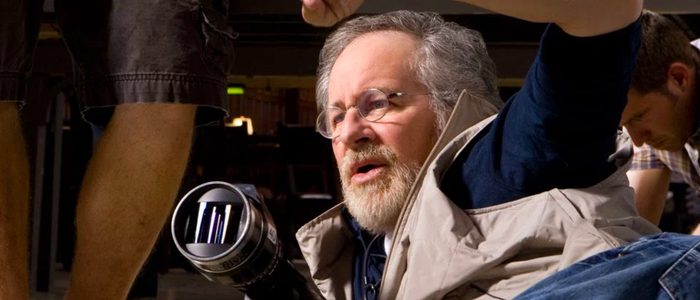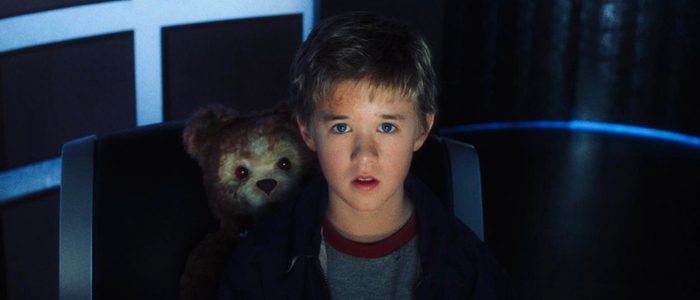21st Century Spielberg Podcast: With 'A.I.' And 'Minority Report,' Steven Spielberg Redefined His Work For A New Century
(Welcome to 21st Century Spielberg, an ongoing column and podcast that examines the challenging, sometimes misunderstood 21st century filmography of one of our greatest living filmmakers, Steven Spielberg. First up: A.I. and Minority Report.)"What if Peter Pan grew up?" pondered the tagline of Steven Spielberg's 1991 fantasy Hook. It was an intriguing premise: what would happen if the perpetual child – the boy who refused to get older – embraced the cold, stark, finite nature of adulthood? Of course, the compelling concept of this tagline is all but forgotten in the runtime of Hook, where the adult Peter Pan quickly reverts to childhood in order to save the day. Still, what a notion!Sometimes, life imitates art. In the 21st century, Steven Spielberg, the perpetual child – the pop culture impresario who found a way to turn childhood and nostalgia into a lucrative, highly entertaining art form – did something remarkable.In the 21st century, Steven Spielberg grew up.
What If Peter Pan Grew Up?
One could argue that the experience of filming 1993's Schindler's List changed Spielberg. The overwhelmingly bleak subject matter took a toll on the director – he would return to his rented home from the set and literally break down sobbing. After the arduous experience of making the film, Spielberg would go on to say, "I feel I have a responsibility...I want to go back and forth from entertainment to socially conscious movies."Yet as the 21st century arrived, Spielberg's filmography blossomed into something different. Rather than succumbing to the "back and forth" way of making movies – juggling between pure pop entertainment and socially conscious message movies – the filmmaker found a way to combine both. Here was something new from the most popular director in history. A brave new world of movies that walked a precarious tightrope; movies that sought to thrill and alarm. To entertain and challenge. The end result might just be the most interesting, most rewarding period of Spielberg's entire career.While he had his career ups and downs, box office success was never an issue for Spielberg. He invented the blockbuster, after all, with Jaws. But through his meteoric rise to become the most popular filmmaker in the history of medium, a fear of illegitimacy plagued the director. He may have trafficked primarily in pop, but he wanted to be taken seriously. Awards were important. Spielberg was so sure that Jaws would land him a Best Director Academy Award nomination that he hired a TV crew to come film him watch the nominations be announced. This plan backfired when Jaws ended up with a Best Picture nom, but not a nomination for Spielberg – something that clearly upset the wunderkind director. He wanted to be more than the king of the blockbuster. He wanted to be an artist.And this longing was something his peers noticed – and exploited. In a 1976 Playboy interview, director Robert Altman observed, "I think Steven Spielberg will endure, though it's tough when a picture like Jaws brings you a lot of success and money overnight that may not strictly be related to the merit of your work. I am not knocking Jaws, which was a magnificent accomplishment for a kid that age. But will he now be able to go off and make a small personal film?"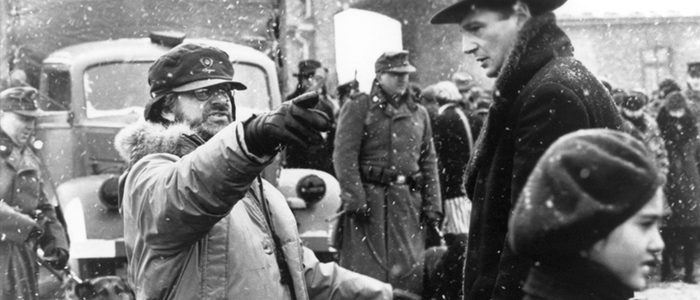 In her New Yorker review of Spielberg's first big screen directorial effort, The Sugarland Express, critic Pauline Kael wrote: "If there is such a thing as a movie sense — and I think there is, Spielberg really has it. But he may be so full of it that he doesn't have much else. There's no sign of the emergence of a new film artist..." Years later, Spielberg would admit he agreed with Kael. "She was right!" he enthusiastically says in Susan Lacy's HBO documentary Spielberg. "I hadn't grown up yet.""People kept accusing me of trying to prove myself," Spielberg said recently, reflecting on his career. "And they wouldn't have been wrong. It was important for me to prove myself in genres that I wasn't known for...I had only been making films for wide public consumption. There were other more – quote-unquote – adult stories that I wanted to tell. And the critics weren't kind to me. I was moving outside of the box they had placed me in."Spielberg had peppered "adult" movies into his filmography before the 21st century. There was 1985's The Color Purple, and 1987's Empire of the Sun. After Schindler's List, Spielberg returned to blockbusters with The Lost World: Jurassic Park, only to then create two adult-oriented dramas: Amistad and Saving Private Ryan.Ryan was, perhaps, the first hint of what Spielberg's 21st century filmography would become. It's a grueling, hyper-violent, emotionally wrought war drama. But it's also an exciting, entertaining action picture. It's the live-action realization of the quote (often attributed by Roger Ebert to Francois Truffaut) that it's nearly impossible to make an "anti-war" film, because movies make battle sequences look so exciting.It wouldn't be until the 2000s, though, that Spielberg really hit his stride combining entertainment and enlightenment. In the 21st century, he would go on to craft a roster of films that blended cerebral-ness with edge-of-your-seat thrills. There will always be a contingent that pines for the pure entertainment of Spielberg's early films. Indeed, one of the primary selling-points of Spielberg's Ready Player One seems to be that it's a "return" of sorts for the director. A return to pure-pop; to mindless fun. To the Spielberg of old.Yet to only long for this type of movie from Spielberg is to ignore the truly stunning work he's created in the 2000s. While the films he's crafted in the 21st century don't always succeed, they are, without question, always interesting. And they are the summation of everything Spielberg had done up to this point. Over the course of several articles, we'll plunge into Spielberg's 21st century work, and reveal the movie magic lurking within.
In her New Yorker review of Spielberg's first big screen directorial effort, The Sugarland Express, critic Pauline Kael wrote: "If there is such a thing as a movie sense — and I think there is, Spielberg really has it. But he may be so full of it that he doesn't have much else. There's no sign of the emergence of a new film artist..." Years later, Spielberg would admit he agreed with Kael. "She was right!" he enthusiastically says in Susan Lacy's HBO documentary Spielberg. "I hadn't grown up yet.""People kept accusing me of trying to prove myself," Spielberg said recently, reflecting on his career. "And they wouldn't have been wrong. It was important for me to prove myself in genres that I wasn't known for...I had only been making films for wide public consumption. There were other more – quote-unquote – adult stories that I wanted to tell. And the critics weren't kind to me. I was moving outside of the box they had placed me in."Spielberg had peppered "adult" movies into his filmography before the 21st century. There was 1985's The Color Purple, and 1987's Empire of the Sun. After Schindler's List, Spielberg returned to blockbusters with The Lost World: Jurassic Park, only to then create two adult-oriented dramas: Amistad and Saving Private Ryan.Ryan was, perhaps, the first hint of what Spielberg's 21st century filmography would become. It's a grueling, hyper-violent, emotionally wrought war drama. But it's also an exciting, entertaining action picture. It's the live-action realization of the quote (often attributed by Roger Ebert to Francois Truffaut) that it's nearly impossible to make an "anti-war" film, because movies make battle sequences look so exciting.It wouldn't be until the 2000s, though, that Spielberg really hit his stride combining entertainment and enlightenment. In the 21st century, he would go on to craft a roster of films that blended cerebral-ness with edge-of-your-seat thrills. There will always be a contingent that pines for the pure entertainment of Spielberg's early films. Indeed, one of the primary selling-points of Spielberg's Ready Player One seems to be that it's a "return" of sorts for the director. A return to pure-pop; to mindless fun. To the Spielberg of old.Yet to only long for this type of movie from Spielberg is to ignore the truly stunning work he's created in the 2000s. While the films he's crafted in the 21st century don't always succeed, they are, without question, always interesting. And they are the summation of everything Spielberg had done up to this point. Over the course of several articles, we'll plunge into Spielberg's 21st century work, and reveal the movie magic lurking within.
Supertoys Last All Summer Long
"They made us too smart, too quick and too many. We are suffering for the mistakes they made because when the end comes, all that will be left is us."The filmography of Steven Spielberg and Stanley Kubrick could not be more dissimilar. Spielberg is a humanist; a storyteller who retains his faith in humanity, no matter how terrible things may get. Kubrick, in contrast, crafted films loaded with cruel, detached irony. Spielberg is the type of filmmaker interested in stories about people who can, and will, save the world from total annihilation. Kubrick was happy to turn the mushroom-cloud laden destruction of the planet into a darkly comedic punchline.This contrast in tone makes 2001's A.I. Artificial Intelligence all the more curious. Here was Spielberg picking up where Kubrick left off, crafting a film that wasn't quite Spielberg and wasn't quite Kubrick, but something in between. This film is the sliver of green flora poking up from the radiated rubble of a bombed-out wasteland.Kubrick had been trying to turn Brian Aldiss' 1969 short story Supertoys Last All Summer Long into a film since at least 1976. The filmmaker would meet with Aldiss off and on over a period of years, all the way up until 1990, discussing ways to turn the story into a feature. For Kubrick, the one hindrance was technology. He wanted his Pinocchio-like tale of a robot boy struggling to be real to star an actual robot. A child actor simply would not do – Kubrick wanted something actually artificial to play artificial. Yet the cinematic technology simply was not there.That changed in 1993, when Kubrick laid eyes on Steven Spielberg's Jurassic Park. Kubrick and and Spielberg had been friends ever since Kubrick's The Shining and Spielberg's Raiders of the Lost Ark shared a set. In 1984, Kubrick told Spielberg about his dream of adapting Supertoys, and Spielberg in turn thought it would make a great film. After seeing Jurassic Park, Kubrick had a eureka moment. The film's history-changing computerized dinosaurs convinced Kubrick that the time had finally come to create the artificial boy at the heart of Supertoys.Yet even though Kubrick felt the time had finally come, he also seemed curiously ready to hand the project off to Spielberg. He told Spielberg in 1994, "I think this movie is closer to your sensibility than mine." Soon after, the directors set up secret fax machines – direct lines to each other, in which they'd fax script pages back and forth. Just as those script pages went back and forth, so too would the directors themselves. Spielberg insisted Kubrick make the film while Kubrick insisted Spielberg should take the project off his hands. Hours and hours of behind-the-scenes pre-production work was done – storyboards, rewrites, test footage. Yet there was no real consensus on just who would direct the film that eventually became A.I. Artificial Intelligence.That all changed in 1999. On March 7, 1999, Stanley Kubrick died suddenly of a massive heart attack. Spielberg was one of the people who gave a eulogy at Kubrick's funeral. But he was already planning a much bigger tribute to the late director – he would finally make A.I. a reality.Where does Kubrick's influence on A.I. end and Spielberg's begin? It's an ultimately fruitless question, but one that still plagued audiences and cinephiles when A.I. hit theaters in June of 2001. Surely, some reasoned, the darker parts of the film must belong to Kubrick, and the lighter be the product of Spielberg. Surely the film's "happy" ending was Spielberg's idea, right?Here's the thing: the ending was actually Kubrick's idea. Here's another: the ending of A.I. isn't actually "happy", despite what some may think.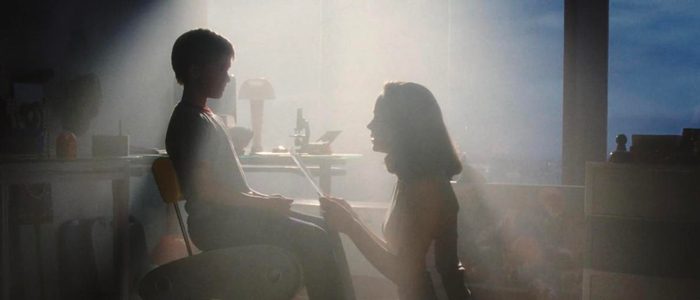
His Love Is Real. But He Is Not.
A.I. is Spielberg's darkest film. Even Schindler's List, with its unflinching, horrific imagery of the Holocaust, and it's soul-crushing coda of Schindler weeping as he admits, "I could've saved more people...", eventually ends on a hopeful note.But there's very little hope in A.I. You could perhaps argue that this is the Kubrick influence shining through, but Spielberg could have changed that if he really wanted to. Instead, he adheres to it – embraces it, even.In fact, in interviews following the film's release, Spielberg would angrily insist the darkest elements of the film were his ideas, not Kubrick's. "All the parts of A.I. that people assume were Stanley's were mine," he said, "And all the parts of A.I. that people accuse me of sweetening are softening and sentimentalizing were all Stanley's."A.I. is so particularly dark because it is, at its heart, a story of the end of humanity. Spielberg, one of our great humanist filmmakers, doesn't traffic in this subject matter often. Even his future War of the Worlds film finds a way to pull us back from the brink of extinction. But in A.I., the clock has run out before the movie even fades in."Those were the years after the ice caps had melted," a narrator (Ben Kingsley) tells us, as waves crash before our eyes. "Climates became chaotic. Hundreds of millions of people starved in poorer countries. Elsewhere a high degree of prosperity survived...when most governments in the developed world...introduced legal sanctions to strictly license pregnancies, which was why robots, who were never hungry and did not consume resources beyond those of their first manufacture, were so essential an economic link...in the chain mail of society."Professor Hobby (William Hurt) is the leading expert on creating these robots. And at A.I.'s start, he's just come up with an unprecedented, near-existential idea: he wants to create a robot that can love. A robot child that will imprint on its human owners, and love them like a real child. It's a perilous concept, and it should come as no surprise when we later learn it's a concept born out of grief – Hobby mourns his dead son, and creates the robot child in the deceased boy's image. With his robot boy, Hobby is recreating his son to be immortal. "A perfect child caught in a freeze-frame," is how he describes it. "Always loving, never ill, never changing."This child caught in a freeze-frame is David (Haley Joel Osment). David ends up adopted by the Swintons – Monica (Frances O'Connor) and Henry (Sam Robards). The Swintons' real son, Martin, is in a coma, with very little chance of recovery. Still, Monica is hesitant – in fact, downright horrified – when Henry brings David home. And who can blame her? David looks human, but he behaves in an eerie, unearthly way. It cannot be understated how engrossing Osment's performance is – the young actor manages to always make his character seem synthetic, even when David is often the most humane character in a scene. With eyes that never blink and a smile that never quite seems natural, David gives the viewer shudders upon his introduction. Spielberg plays up the alien-like nature of the character, having him first appear distorted behind some textured glass. He's like a shadowy creature emerging from another dimension.The best way to make David seem more human is for Monica to imprint upon the robot boy by uttering a string of random words. This action comes with a grave warning: once imprinted, David cannot be simply returned to the factory if Monica decides she doesn't want him anymore. He would have to be destroyed.Undeterred by this, Monica imprints on David, and he does indeed begin to behave more naturally – although never quite naturally enough. Mother and robot-son begin to bond, but the bonding is short lived. When Monica's real son Martin wakes up, David becomes obsolete – like an old iPhone that just doesn't seem so cool anymore. In Monica, Spielberg has created something rare for his filmography: a neglectful mother. Absentee fathers are a running theme in Spielberg land – Roy Neary abandoning his family to go cruising around the galaxy with aliens in Close Encounters of the Third Kind; Elliot's often-mentioned, never-seen father living a whole new life somewhere else in E.T.; the workaholic adult Peter Pan in Hook.This is a theme plucked from Spielberg's own life. His father Arnold was often engrossed in his work, and when Spielberg's parents split, he laid the blame of the divorce on his father. Later, he'd learn that the divorce was the result of an affair his mother, Lee, had had with a family friend. Still, for years, Spielberg would resent his father while putting his mother on a pedestal. This father-resentment peppered most of his films, but with A.I.'s Monica, he turns the tables.Once Martin is home, Monica drives David out into the woods and abandons him. The argument could be made that technically, Monica isn't being a bad mother, because David isn't really her son. He's an object – something created in a factory. Yet before Martin's return home, Monica was happy to love and adore David as her own. Or at least pretend.To David, however, that love was real. Or was it? He'll spend the rest of the movie desperately trying to get back to Monica, believing that when he does, she'll embrace him. But that's what he's programmed to think. The imprint has turned him into a helpless, hapless object entirely devoted to Monica. "His love is real, but he is not," claimed the A.I. tagline – but is his love real? The more you peel away the layers, the more complicated it becomes. "Love will be the key," Professor Hobby says at the start of the film, "by which they acquire a kind of subconscious never before achieved. An inner world of metaphor, intuition, a self-motivated reasoning, of dreams."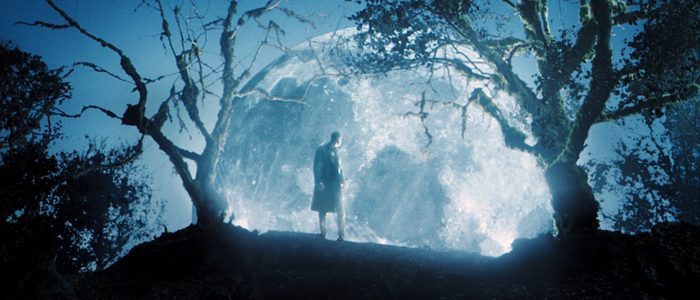
To the Flesh Fair, and Beyond
After being abandoned by Monica, David ends up at the Flesh Fair – a nightmarish gathering that looks like a Trump rally on acid. Here, obsolete, older robots are torn limb from limb, set ablaze, and utterly destroyed to the cheers of a giddy human crowd. The humans at the Flesh Fair resent robots; resent what they represent. And yet in most ways, these robots are reflections of the humans – machines engineered to handle menial tasks, like waste collection. Humanity made these creatures to do the dirty work, and now humanity hates what it's created.There's an abject cruelty in this sequence that rivals the harrowing scenes of Schindler's List. Spielberg rarely goes cruel with his films, and when you watch the many tortures and destructions on display in the Flesh Fair sequence, you get the sense that the filmmaker is disgusted with what he's filming. Most frames of a Spielberg film are brimming with joy, but the Flesh Fair is soul-crushing. If it had lasted any longer, A.I. might have actually suffered.David escapes the Flesh Fair intact, and teams-up with Gigolo Joe (Jude Law), a pleasure-bot who is on the run after being framed for murder. The early 2000s saw Law overexposed in an abundance of roles, but few filmmakers knew how to use his charms. Spielberg, however, draws a limber, seductive, fantastic performance from the actor. Law soft-shoes his way through the film like a synthetic Gene Kelly.Thanks to the story of Pinocchio, David has it in his head that if he can find the fabled Blue Fairy, and be turned into a real boy, Monica will love him. Joe's advice: head to Rouge City, a neon-lit pleasure-town. A futuristic Atlantic City, where huge neon lights advertise sins of the flesh, and more. If the Flesh Fair sequence is Spielberg disgusted with what he has to create, the Rouge City scenes are the opposite – wild and hectic, with nearly every inch of the frame occupied by some sort of technological wizardry.The Blue Fairy is not to be found in Rouge City, and David and Joe's travels land them in water-logged Manhattan. Here, the tops of skyscrapers jut out from high seas – a fading, sinking reminder of more of humanity's failure. We built these tall, imposing structures to awe, and yet we're helpless to save them from being swallowed-up by the tides.David finds the offices of Professor Hobby, and is treated to a lightning-strike of existential dread when he finds yet another David in the building. The other robot boy is cheerful and polite, but our David is overcome with terror and rage. He smashes the other David to pieces – a scene that's jaw-dropping in its savagery. Up until this point in the film, David is a passive creature. Whenever danger rears its head, he's prone to hide behind the nearest adult while whimpering, "Keep me safe, keep me safe," over and over. Here, presented with the realization that he's no longer unique, no longer special, he snaps. He wants to be the special boy that Monica will love, but how can he when there's an identical version of him in the world?"I thought I was one of a kind," he moans to Professor Hobby."My son was one of a kind," Hobby replies. "You're the first of a kind."This isn't enough for David. Weary and full of self-doubt, he's ready to give up. He's realized he's just another mass-produced product – a product Monica will never truly love. His reaction is to fling himself into the seas that have swallowed up Manhattan. There, at the bottom of the sea, he finally finds the "Blue Fairy": a submerged statue nestled in a sunken amusement park. There he waits, for centuries upon centuries, begging this inanimate object to make him a real boy.It's 2000 years later when David is rescued – pulled from the frozen landscape that was once New York. Human beings are completely gone, and all that remains are highly-advanced robots that resemble aliens from outer space rather than man-made machines. They resurrect David, curious to learn about times long-gone. And they offer David a kindness: they can resurrect Monica for one brief day, if that's what David really wants.It's this sequence that drew the most criticism for Spielberg. Many argued the film should've ended with David trapped beneath the sea, making a wish that never came true. The film's real conclusion, some said, was too schmaltzy; too kind. Yet it's not kind at all. And it's something Kubrick thought up himself, long before Spielberg came aboard.Sara Maitland, whom Kubrick worked with on a story treatment, said Kubrick saw the ending as temporary: "David's dream of her is in the way the memory is like a dream. He's given back his memory, not his mother." Yes, Monica is resurrected, and yes, she spends one "perfect" day with David. But she has no idea where she is – she has no idea what century the two are even inhabiting, or that she's been dead for thousands of years. And she certainly seems to have no recollection of Martin, her real son.Instead, she play-acts through a fun yet artificial day with David. Here, in this fleeting moment, David finds the love he's longed for. But it's not real. And it'll be gone soon – once Monica falls asleep, the restrictionist robots tell David, she'll die again. And as for David, there's no telling what his future will be. He falls asleep besides Monica, and perhaps this is the end of David's life as well. His real wish – to be a human boy – is never granted.
The Shape of Things to Come
A.I. wasn't exactly critically drubbed when it hit theaters in 2001, but few people seemed to realize its impact. It was a different sort of Spielberg movie, sure – but no one seemed to realize it would be the start of something new for the filmmaker. The catalyst that would inform all of his 21st century work to come.It even looked different. With A.I., Spielberg was working yet again with cinematographer Janusz Kaminski, but the look of the film is far removed from any Spielberg film before it. It's full of hazy lights, and a sterile, metallic sheen. It's a look that would continue onward into more of Spielberg's 21st century work.Anyone hoping Spielberg would return to his light blockbuster roots was going to be in for a rude awakening. For his next film, Spielberg wasn't done with the future yet. He would cast the leading box office draw of the time – Tom Cruise. The story would come from Philip K. Dick, the creator of Blade Runner and Total Recall. It had all the makings of a potential popcorn movie. But the end result would be far from ordinary.Of Minority Report, Spielberg would go on to say: "It's a popcorn movie – but a gourmet popcorn movie."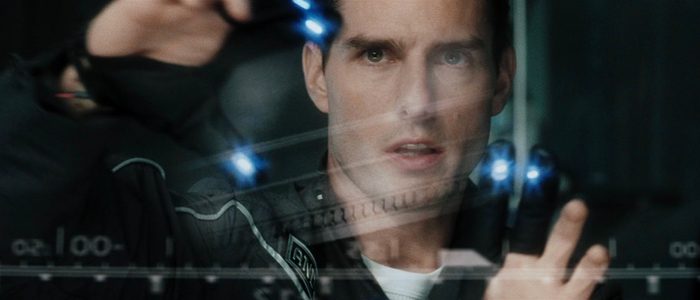
Who-Will-Do-It
"Everybody runs."Spielberg would never again make a movie as hopeless as A.I. (at least not yet). But the Steven Spielberg filmography that followed A.I. proved it was no fluke; no brief diversion. The Spielberg of the 21st century was more cynical; more prone to go to dark, unpleasant places. After the somewhat reserved reaction to A.I., Spielberg perhaps realized that he'd get better traction if he wrapped these unpleasant ideas in a blockbuster package. Enter Minority Report.A.I. was released less than four months before 9/11; in the film, the Twin Towers are still standing in the future, jutting from the waters that have swallowed-up in New York. Yet in real life, the towers would soon be gone, and the world itself would never be the same. America, and the world at large, was entering into a dangerous new period. It would be naive to say we lost our innocence after September 11, 2001, but the simple fact was that the world was turned upside down following the events of that fateful day, and the world of movies followed accordingly.Almost immediately, films set in New York rushed to digitally erase the Twin Towers from background shots. Sony had put together a memorable teaser for their upcoming Spider-Man, with everyone's favorite web-slinger catching some helicopter-flying crooks in a web stretched between the two towers. After September 11, Sony rushed to remove the teaser from theaters, and nixed a poster that showed the towers reflected in Spider-Man's eye. The fact of the matter seemed to be that Hollywood wanted to avoid the subjects of 9/11 and its aftermath. Spielberg had other ideas. Spielberg's first true foray into the post-9/11 world came less than a full year after the attacks, in June of 2002. The film was Minority Report, and while it wouldn't distinctly reference the September 11 attacks, it's nearly impossible to separate the real-life events and their aftermath from the narrative. Spielberg would shy away from overt political connotations after the film came out. The Bush administration was amping up for war, and there was a distinct, and terrifying, "you're either with us or against us" mentality permeating much of the zeitgeist. Yet in some interviews, Spielberg wasn't shy about the 9/11 connections. According to Spielberg, Minority Report was asking a distinct question: "How many of our civil liberties are we willing to give up because the government tells us we have to in order to protect us from terrorism in the shadow, the aftermath, of 9/11?"At its heart, Minority Report is a mystery. A sort of hard-boiled work of pulp set in a not-too-distant future. The mystery genre was one Spielberg had yet to work in, and exploring these new grounds was part of the draw of the film. "I want to tackle subjects I haven't really tackled before," he explained at the time. "I'm in a period in my life of experimentation and trying things that challenge me. Minority Report is really a mystery. It's a who-done-it or who-will-do-it, and you're along for the ride."But once you get beyond the mystery, you're also presented with an eerily prescient glimpse of a future where privacy is a thing of the past. Here in 2018, in the wake of daily news stories about Cambridge Analytica and their stealing of data, elements of Minority Report feel less like science fiction and more like science fact.There's a distinct reason Spielberg got the future so right with Minority Report. Before making the film, the director assembled a think tank of great minds to hash-out the futuristic elements of the story. "I thought it would be a good idea to bring some of the best minds in technology, environment, crime fighting, medicine, health, social services, transportation, computer technology and other fields into one room to discuss what the future a half a century hence would be like," Spielberg said.M.I.T. scientists, urban planners, architects, inventors, and writers came together at a hotel in Santa Monica, California, to concoct the futuristic details of the film. Spielberg, screenwriter Scott Frank, and production designer Alex McDowell and his team sat in on the meetings, and over a period of three days, they came up with the future world of the film. The end-result is nothing short of stunning, and also disturbing in its accuracy. 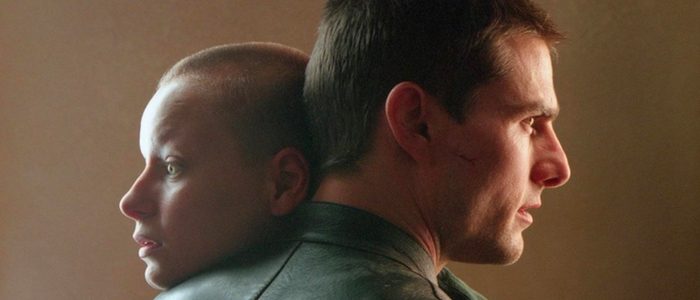
“Murder”
In this futuristic world, murder is a thing of the past, thanks the Pre-Cogs – three psychic beings who can predict murder before it happens. Heavily medicated, they float in tanks, their very thoughts hooked into complicated (and never entirely explained) tech that broadcasts their visions into mini-movies for officers of the Pre-Crime division to see. The top cop in charge of it all is John Anderton (Tom Cruise). Years ago – before the use of the Pre-Cogs – Anderton's son vanished from a public pool, and Anderton has been beating himself up ever since. Now, he handles the Pre-Crime division in a tough, no-nonsense way – when not self-medicating. The Pre-Cogs predict a murder, and Anderton and his team spring into action.The perps they collar – or, more accurately, "halo", by placing ring over the suspect's head that sends them into a coma – haven't really committed a crime yet. They've only thought about committing a crime. But that's good enough for Anderton, his team, and his boss, Director Lamar Burgess (Max von Sydow).Yet the concept of the Pre-Cogs, and the Pre-Crime division, doesn't quite sit right with some members of the Justice Department. Enter Danny Witwer, played by Colin Farrell right at the cusp of his big break-out career. Witwer is there to audit Pre-Crime and make sure everything is on the level. As bad luck – or perhaps fate – would have it, soon after Witwer arrives, things start to go very, very wrong for John Anderton.When the Pre-Cogs have a vision of murder, the respective names of the victim and murderer are engraved on separate wooden balls. The sequences showing the creation of these balls unfolds with high energy, with Spielberg capturing every single moment – from the ball rolling down a Rube Goldberg-style chute, to a laser cutting the names into the wood – like a giddy kid obsessing over his toys. These early scenes set the energy for the film. Minority Report never slows down. It's always on the run. And so, too, is John Anderton. Because a ball has just come in with his name on it. According to the Pre-Cogs, someone is going to be murdered very soon – and John Anderton is going to be the one to pull the trigger.It's high-concept as hell, and it's a hoot. How do you stop a murder if you yourself are supposedly the murderer? Anderton thinks he's being set up – perhaps by Witwer – and he's determined to prove it. Occasionally, the Pre-Cogs are in disagreement, and this disagreement creates a minority report. If a minority report exists clearing Anderton's name, it will reside in the more powerful of the three Pre-Cogs – Agatha (Samantha Morton). Anderton's solution is to abduct Agatha from the halls of Pre-Crime and try to use her to fight the future.It's hard to believe that Spielberg and Cruise had never worked together before Minority Report. Both are superstars in their own respective fields, and it seemed only natural that their paths would eventually cross. At the time, Cruise was still coasting on his nice-guy persona – his famous smile had a starring role in all his films. But Spielberg specifically instructed Cruise not to flash that grin in Minority Report. Instead, he drew a frantic, manic performance out of the actor. In years to come, frantic mania would be commonplace for Cruise – especially after his couch-jumping appearance on Oprah. At the time, though, it seemed fresh. A new direction for Hollywood's number one leading man – a chance to stretch himself more.The real MVP of Minority Report, however, is Samantha Morton, who gives what might be the best performance in any Steven Spielberg movie, ever. When Morton's Agatha is pulled from her tank, she's a mess. She hasn't been in the real world for years, and everything on the outside is terrifying. At the same time, she's having constant flashes of the future, and Morton portrays all of this with a wide-eyed, painful innocence that at times is almost too much to bear. Agatha is constantly being torn apart inside, and Morton nails that. In a quick yet harrowing scene, she clasps the arm of a random woman and rasps, "Don't go home – he knows." We get no further explanation of this, but from Morton's delivery we know exactly what's going on – someone at home is waiting to kill this woman, and Morton is desperately trying to save her life.We ache for Agatha. Indeed, we care more about her than Anderton. Later, when Anderton is captured and Agatha is reintroduced to her tank environment, it's infuriating. She was free, damn it, and they just locked her away again.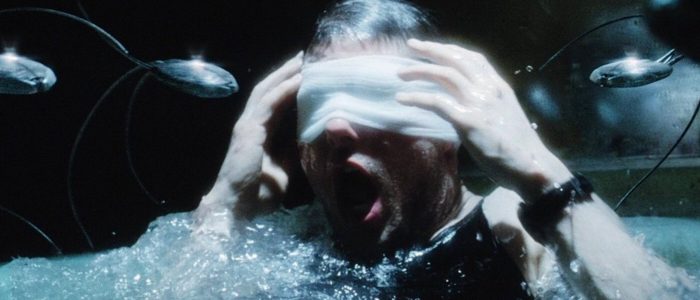
The Eyes Have It
On a surface, Minority Report is all about set-pieces. Spielberg stages one high-octane, sublimely entertaining set-piece after another as he moves Anderton and Agatha from one place to the next.When Anderton first breaks Agatha out, the pair storm through a mall – where all the advertisements are tailor-made to know exactly who you are, like internet pop-up ads. Every step of the way, Agatha throws out weary advice to help Anderton evade capture – stop here; go left; drop some change. At one point, she advises him to steal an umbrella – an act that makes little sense until the two get outside and find it to be pouring rain. There, Anderton opens the umbrella, and the pair blend into a crowd of umbrellas.Another highlight includes a chase sequence on a car assembly line, where Cruise ends up inside a car as its being created – only to drive the car away when it's done.But the real show-stopper is a lengthy, nightmarish sequence involving an eye transplant. The eyes of individuals in this society are the number-one point of identification. As long as Anderton is walking around with his own eyes, ever-present scanners – like the ones in the mall used for advertisements – will be able to pick him up. His solution is to get a black-market eye-transplant.While Anderton is healing at a rundown apartment building, the police arrive looking for him. Rather than go floor to floor, the cops deploy spider-like drones that scurry about from floor to floor, crawling under door cracks and scanning the eyes of the residents with in. The residents have no rights here; no say in the matter – they have to simply sit back and take it. Spielberg stages this in engrossing, often comedic fashion. He plants his camera above the rooms, and travels from one room to the next, as if we're viewing an architect's floor plan. From one room to the next, we look down at the residents interacting with the spiders. One couple are in the middle of a fight, and pause briefly to let their eyes be scanned – only to start fighting the minute they're cleared. One man sits on a toilet and doesn't even react as the mechanical spider climbs up his body. It's so goddamn cinematic to watch that it puts almost all of Spielberg's contemporaries to shame.Yet for all Spielberg gets right with Minority Report, he can't quite stick the landing (although this problem mostly lies with Scott Frank and Jon Cohen's script). The film spends so long being so lightning-quick and pulse-pounding that when it slows down to spell out its plot, it gives the audience whiplash.Anderton was indeed being set-up, but the setup is almost too complicated and too convoluted to really make sense, or even be plausible. Nonetheless, Anderton ends up being haloed, and placed in an eerie, haunting future-prison with other Pre-Crime suspects – locked away in suspended animation.Anderton's estranged wife (Kathryn Morris) – a character that just never quite works, and seems unnecessary in the long-run – springs him from prison to help stop the man who orchestrated all this trouble: Director Lamar Burgess. Burgess eventually dies, Pre-Crime shuts down, and the Pre-Cogs are free. They get to live out their lives on an secluded island somewhere, while Anderton reunites with his wife.There's an uneasy question to this ending – was shutting Pre-Crime down the right thing? Or was the program a necessity, despite its flaws? The same questions can, of course, be applied to the real-life war on terror. But frustratingly, even though Spielberg starts the film out asking these questions, the ending doesn't provide much closure either way. Perhaps it's too difficult a question. Perhaps it's a question that's up to the future to decide.Still, Minority Report is remarkable in that it crafts this big, complex ideas onto a crackerjack blockbuster full of huge action beats. On a purely technical level, it's one of Spielberg's most masterful works – a film with more energy than most modern-day action flicks can muster. It was a sign of things to come.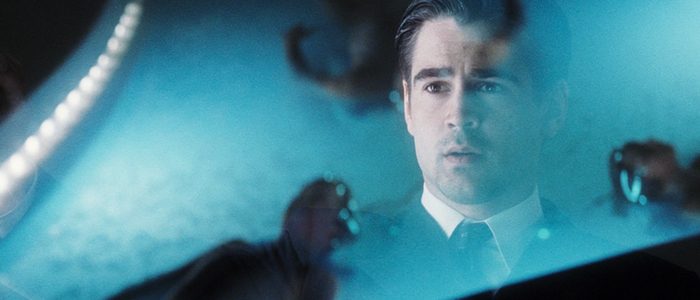
Experimenting
"Right now in my life I'm in a period where I'm experimenting, where I'm trying things that challenge me," Spielberg said when Minority Report was being made. "And as I challenge myself, I also challenge the audience. Now I feel that I'm striking out in all directions trying to find myself, trying to discover myself."As the 21st century kicked-off, Steven Spielberg had begun a journey. With A.I. and Minority Report, he had crafted two of his most challenging, exciting, cerebral films. He wasn't leaving his early blockbuster days behind. He was molding them into something brand new – he was experimenting, and we, his audience, were his test subjects.From the blue-tinted, often terrifyingly dark future worlds of A.I. and Minority Report, Spielberg would move on to the brighter-lit yet just as unique films Catch Me If You Can and The Terminal. In the early 2000s, Steven Spielberg was just getting started.
***
In the next edition of 21st Century Spielberg, Part 2: Phone Home – Catch Me If You Can & The Terminal.

